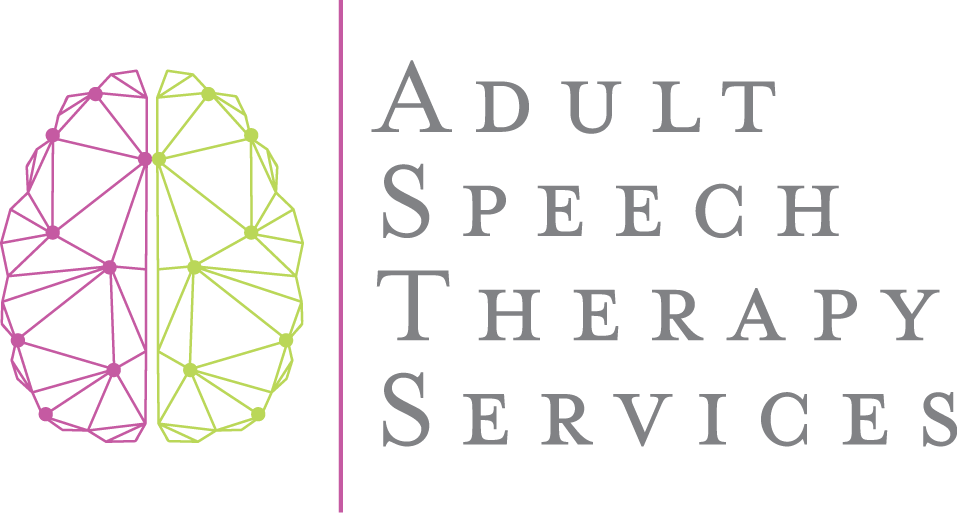If you are experiencing chronic hoarseness, frequent periods of laryngitis, or other voice problems such as muscle tension dysphonia, vocal cord dysfunction, vocal tremor, or spasmodic dysphonia, you are likely a good candidate for voice therapy. It’s important to find a speech therapist with experience treating voice disorders. Adult Speech Therapy Services specializes in the treatment of voice disorders to improve your voice quality, and function to maximize communicative success.

Voice Therapy
Voice therapy treatment includes:
- Education about the causes, treatment options, and treatment outcomes for your diagnosis
- Reducing vocally abusive behaviors
- Establishing better breathing habits to support your voice
- Exercises to improve voice quality, pitch range, resonance, and to reduce muscle tension
- Compensatory strategies to support successful communication
- Establishing a home exercise plan
MUSCLE TENSION DYSPHONIA
What Is Muscle Tension Dysphonia?
Muscle tension dysphonia (MTD) is one of the most common types of voice disorders. It occurs when there is excess tension in the muscles surrounding your vocal cords.
This can be caused by irritation of the vocal cords, voice misuse, or stress. Symptoms include a hoarse or strained voice, changes in voice pitch, throat pain, or voice fatigue with use. MTD is often diagnosed by and Otolaryngologist or ENT.
How Can A Speech Therapist Help with MTD?
An experienced speech therapist can teach you how to take better care of your voice. This can include simple changes like decreasing your daily caffeine intake and improving your hydration. Your speech therapist will also teach you exercises to decrease tension and to strengthen your voice. Voice therapy will include creating a customized home exercise program.
VOCAL FOLD DYSFUNCTION
PARADOXICAL VOCAL FOLD MOTION
What Is Vocal Fold Dysfunction?
Vocal Fold Dysfunction (VFD,) also known as Paradoxical Vocal Fold Motion (PVFM) is an often misdiagnosed condition resulting from irritation of the pharynx or upper airway.
This irritation causes episodes of breathing difficulty and sometimes a hoarse voice. These episodes can be triggered by reflux, allergies, odors, and many other factors. Oftentimes people with VFD are misdiagnosed with asthma or allergies before receiving an accurate diagnosis of VFD.
How Can A Speech Therapist Help with VFD?
Speech therapists, or speech-language pathologists, are very knowledgeable when it comes to the anatomy and physiology of the voice and throat.
Individuals with VFD are referred to SLPs to learn about the causes of VFD, it’s triggers and how to respond to and eventually prevent episodes of breathing difficulty. Call today for a free consultation.
VOCAL TREMOR
What Is Vocal Tremor?
Vocal tremor is one of the most common neurologic movement disorders. Individuals with vocal tremor experience rhythmic movement of some of the muscles used to produce voice. This results in an involuntary variance in vocal loudness and pitch.
Vocal tremor is often diagnosed by an Otolaryngologist or ENT. Treatment for vocal tremor can include medications, Botox injections, and voice therapy. Voice therapy can be conducted in conjunction with Botox injections.
How Can A Speech Therapist Help with Vocal Tremor?
An experienced speech therapist can identify how vocal tremor affects communication. Treatment includes improving breathing for speech, and recommendations for use of exercises and strategies that will make speaking less effortful and more effective.
SPASMODIC DYSPHONIA
What Is Spasmodic Dysphonia?
Spasmodic dysphonia (SD) is a neurologic voice disorder or dystonia. The exact cause of SD is still unknown, but it occurs when signals from the brain cause the muscles for producing voice to spasm. These spasms result in a voice that sounds strained, hoarse or breathy.
The majority of individuals with SD are female, and symptoms tend to worsen initially, and then plateau after 1-2 years following onset. SD is often diagnosed by an Otolaryngologist or ENT. Treatment options include medications, surgery, Botox and voice therapy.
How Can A Speech Therapist Help with SD?
A speech therapist can help an individual with SD to better understand their diagnosis and treatment options. Voice therapy will include teaching strategies to improve overall communicative success, along with exercises and techniques to improve breath support for speech and decrease muscle tension in the throat. The goal of voice therapy is to decrease effort associated with speech and improve communicative success.
CHRONIC COUGH AND THROAT CLEARING
What Is Chronic Cough/Throat Clearing?
Chronic cough is a persistent cough that lasts longer than 8 weeks. It leaves a sensation for the frequent need to cough or throat clear. There are multiple factors that can cause chronic cough such as allergies or sinus problems, asthma and other breathing problems, and acid reflux. Chronic cough and throat clearing may impact voice quality, creating a rough sounding voice.
What Can A Speech Therapist Do to Help with Chronic Cough?
Speech therapists work closely with other medical professionals on the care team such an allergist, pulmonologist, otolaryngologist (ears, nose, and throat doctor), and a gastroenterologist. Speech therapists help individuals understand the triggers of chronic cough, teach ways to lessen coughing, and provide vocal hygiene measures to help keep vocal folds healthy.
Source: https://www.asha.org/public/speech/disorders/chronic-cough/
Testimonials


